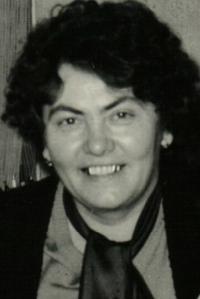“Well, you know, when we moved there, my dad got a new cart. There was a Tischlar, also a Slunský, someone from the family, and my dad had that cart made by him. And then we had to leave. And he said, ‘I will not let the cart there, I’ll take it with me’. So he told me how he got here to Mackovice. The name of that director was Kutchan and he had vineyards in Miroslav. He was the director at the Hrusovany estate. The Croats were in Jevišovka and I don’t know how my father came to do that, but he found a couple of guys and they got to his vineyards and harvested the grapes. And then there was the deportation and my dad said that he’d not go there. Because our people had to move all the way to the north to take the houses left behind by the Germans. But my dad said: ‘I won’t go. I’m being expelled from my own house, driven to the north to occupy someone else’s house? I’ll rather go to the estate’. But nobody wanted to go to work on the estate because you didn’t get a replacement if you did. We left, but we didn’t get any replacement. My dad had to buy that house for himself. Well, Kuthan said to my dad: ‘Tomša, would you like to work on my estate?’ And my dad said: ‘Why not, I was never afraid of work. I served in Austria’. ‘Well, in Mackovice, there is one house, it’s wrecked but one room might be fixed, but otherwise, there’s not many other places to live there’. Because the houses there had already been taken, since 1945. There it was all German, too. And so my dad said that if there is one good room where we can live, he’d go there. So he went to see the house and stayed there in May, we moved in with my mom in August and I went to school in September. It was in 1950. We had one room and nothing more. But my dad begged the director if he couldn’t find him something better. So he took the cart, plows, harrows, he took it all. But otherwise, we didn’t get anything for the house, cows, furniture, nothing. All of this remained there. We just had a rather old table and that he allowed us to take with us. And two chairs. My mom also took some sacred images. The policeman looked on, but didn’t say anything. We were supposed to go to Huzová. However, the director arranged for my father to be allowed to stay in Mackovice. Well, so we were here in Mackovice and gradually everybody else was leaving. Uncle Matěj had to go to Skřipov, uncle Ferbár to Skřipov too, aunt Honimonova, my mother’s sister, had to go to Huzová, my dad’s sister was in Jívová. And gradually, as they were all leaving and leaving behind empty houses, my dad tried to get his family over. Well, that was it. So then we had uncle Ferbár coming over, aunt Solomon was here as well, there was aunt Sičová too, uncle Antonín was there, everyone here in Mackovice, but it was all my dad’s family. Aunt Růža was here as well...”

